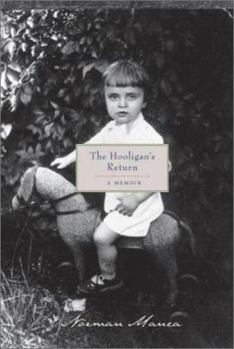The Hooligan's Return: A Memoir
Select Format
Select Condition 
Book Overview
The long-awaited memoir by one of Romania's greatest living authorsThe Hooligan's Return is a haunting memoir, vividly re-creating Norman Manea's harrowing childhood in Fascist Romania while providing indelible portraits of Ceausescu's dictatorship and the pre- and post-Communist eras.Manea's observations about his visit in 1997 are intertwined with his reflections on his return to Romania after four years in Transnistria, in the camps to which large...
Format:Hardcover
Language:English
ISBN:0374282560
ISBN13:9780374282561
Release Date:August 2003
Publisher:Farrar Straus Giroux
Length:400 Pages
Weight:1.25 lbs.
Dimensions:1.2" x 6.4" x 9.0"
Customer Reviews
2 ratings
This is the real thing: NOT a "pseudo-Romanian" writer!
Published by Thriftbooks.com User , 19 years ago
Francine Prose's blurb says it all: check it out on the inside cover of this book. THR is a multi-layered memoir that does not always proceed in chronological fashion. This story of a Romanian exile's return to his homeland is more substantial and real than Romanian-born writer Andrei Codrescu (who changed his surname from Perlmutter to "Codrescu," probably to appear more exotic in the US). When Norman Manea fears encountering the staff at the Intercontinental Hotel in Bucharest, he has REAL reason to, unlike the poseur "Codrescu," who likes to fancy himself a revolutionary. In 1992, Manea penned a controversial essay on M. Eliad, a conflicted man whose relations with Romania's ultranational Iron Guard caused him much intrapersonal conflict. Manea also blew the whistle then on the RO community in chicago where a significant community of IG sympathizers still carry the flame today. In fact, he intimates, there may yet be a connection between the IG/Chicago Legionnaires and the Securitate in RO even today. Dangerous stuff even in these enlightened times some 60+ years later after the changing of the fascist/communistic guard in RO. Debates of this type go on in all eastern European countries, as they begin to sort thru their messy post-fascist/post-communist pasts; combine this with the added and ironical baggage of having many former Party leaders morph into "democratic" leaders. Absurdity never dies. Manea inspires his readers to delve into the works of other RO writers like Cioran, Paul Celan, I. Culianu, Petru Cretia...so Francine Prose sums things up neatly with her observation that "THR operates on so many levels that finally, it eludes all classification." Well said.
A great autobiography
Published by Thriftbooks.com User , 20 years ago
This is a wonderful, if difficult book. It cronicles the author's life. Norman Manea suffered from both the Holocaust and Communism. Being Jewish, he and his family were deported during the Second World War to a concentration camp set up by Romania's fascist regime (General Ion Antonescu, Hitler's ally) in Transnistria, where several hundred thousand Jews were imprisoned and died in horrible circumstances. Luckily he survived the KZ and returned to Romania. Later on, when he had become a writer, he was declared enemy of the state and a 'hooligan' by Romania's Communists, because he had dared criticize the antisemitic government in an article. (Another fascinating Romanian-Jewish writer, Mihail Sebastian (see his Jurnal) was described as a 'hooligan' by antisemits in a literary scandal back in the 30's - the term has deep connotations for Manea). His relationship to his homeland remained troubled even after he left Romania in the 80's, settling down in New York as a professor for literature (he teaches at Bard College). Although he is one of Romania's best writers, his country's literary elite treats him with a certain embarassment. He can be compared in this respect to Imre Kertesz's relationship with Hungary.I liked this book not only because of all the detailed, multi-faceted and subtle description of these events, but also because it is an honest and selfironical autobiography. Manea is a reluctant autobiographer. My feeling is that he wrote this book out of duty; not to brag about his past, rather to pay tribute to those he loved and to remind the world of the terrible journey he has been through - a very typical journey for Jews and many East Europeans in the 20th century... P.S. If this book is superfluous, then so are the books by e.g. Anne Frank, Primo Levy and Mihail Sebastian. Good luck in burning them!






